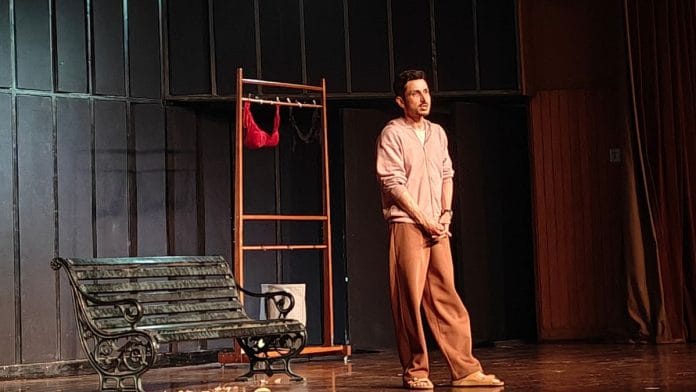New Delhi: On a particularly warm Saturday, 28 September, actor Amol Parashar performed a 75-minute solo show about sex, shame, and intimacy at Delhi’s Stein Auditorium. Written and directed by Vijay Ashok Sharma, the performance — Besharam Aadmi — was part of The Habitat’s 10-day theatre festival that began on 19 September. The Delhi audience braved dandiya crowds and weekend traffic to reach the sold-out show, which ended with a standing ovation.
“The idea came from a very personal experience four years ago, a few months after my own marriage, and I had decided to write something on it. It eventually evolved into two separate solo shows,” said Sharma, who grew up in Guwahati. One, ‘Papa Painter’, is performed by Sharma, while Parashar took on ‘Besharam Aadmi’.
The quirky comedy follows a character who sees himself as a “progressive, rational, empathetic man” with no hang-ups about sharing chores with his wife, even making sure he cooks her favourite breakfast every morning. He even washes her lingerie without a second thought. But one day, he dreams of his father walking in while he is holding his wife’s bra. That unsettling image makes him question why his life feels as though it is unravelling, and why he cannot live up to his own ideals of equality.
Also read: Burqas off, stories out—Delhi’s ‘Bhaagi Hui Ladkiyaan’ lay bare their world on stage
The poster and the play
The show’s poster has Parashar alongside a bright red bra– a deliberate tactic.
“I wanted to capture the audience that usually goes for standup performances, who want to watch something fun. With the word ‘live’ written alongside my name, a lot of people also anticipate it as more of a standup performance rather than a play,” said Parashar.
One by one, On stage, Parashar takes the audience through a cascade of thoughts: Is this about society’s expectations of masculinity? Or about intimacy and comfort in front of one’s parents? The play gradually expands into the many “uncomfortable” discussions that rarely take place in middle-class families.
Sharma’s writing makes use of double entendres, like cricket as a metaphor for sex, and even highlights how new-age couples opt to have pets instead of children, an idea that would horrify traditional couples. These are then layered with exploration of taboo topics.
Except for a cannonball tree and an old park bench, the stage was empty. Yet Parashar, dressed in track pants and a sweatshirt, managed to keep the audience off their phones for nearly the entire performance.
Also read: This Delhi play is all about a hospital waiting room—5 actors, no plot and a damp basement
Adapting and evolving
Although ‘Besharam Aadmi’ is usually performed in intimate settings, the Delhi segment of the tour was staged in a bigger space, drawing 400 people.
“Stein has a certain kind of theatre-going audience, and it is a contemporary play, so we also made minor changes to adapt to the venue,” said Sharma.
Over its six-month journey, the show has undergone small tweaks. References to food were localised — litti chokha became chole-bhature in one segment — and some jokes were improvised. Themes of the saviour complex, unlearning gender stereotypes, and the sexualisation of women’s clothes are brought up in ways that don’t trivialise, even while using comedy and one-liners.
Still, the script’s core has remained unchanged: the idea of love and equality in marriage.
“It is about loving your partner, in the way they feel loved, and not caring about what society says. So one dialogue about making breakfast and watching the wife’s smile was something I came up with at the Stein performances,” said Parashar.
He was referring to the end of the play, where the protagonist resolves to work on his own unlearning, and not letting his struggles impact his relationship with his wife.
Also read: Three women over 60 are redefining Delhi theatre. ‘People think we’re mad’
Different audiences, different reactions
While the shows in Delhi and Gurugram attracted vocal, appreciative crowds, the Noida leg saw a relatively lukewarm response.
“There weren’t as many laughs. Maybe with the location being a comedy club, they expected the jokes to be more direct,” said Sharma.
At Stein, the audience began reserved, even hesitant when Sharma opened by asking, “On the scale of 1-10, how besharam (shameless) are you?” But as Parashar settled in, murmurs and awkward chuckles gave way to claps and laughter at his one-liners.
“I would definitely like to bring my boyfriend for the next show. We always have arguments about how chores are handled, and how women’s outfits are sexualised. This would be a fun way of conveying the message,” said Tulika Dhawan, a 22-year-old PR executive who stayed back to greet both Parashar and Sharma.
It wasn’t just Gen Z that connected with the play. Older audience members also praised the content and Parashar’s performance, with many approaching him after the show.
The performance ends up with lingerie hung out to dry on a clothes rack, by then, the audience is visibly less uncomfortable with the questions the play raises.
“From Mumbai, Pune, and Bengaluru to now NCR, I have had elderly people come up to congratulate me, and appreciate the play. They often say that these incidents have happened with them, but they never quite had the language to discuss them,” said Sharma.
(Edited by Prashant)






